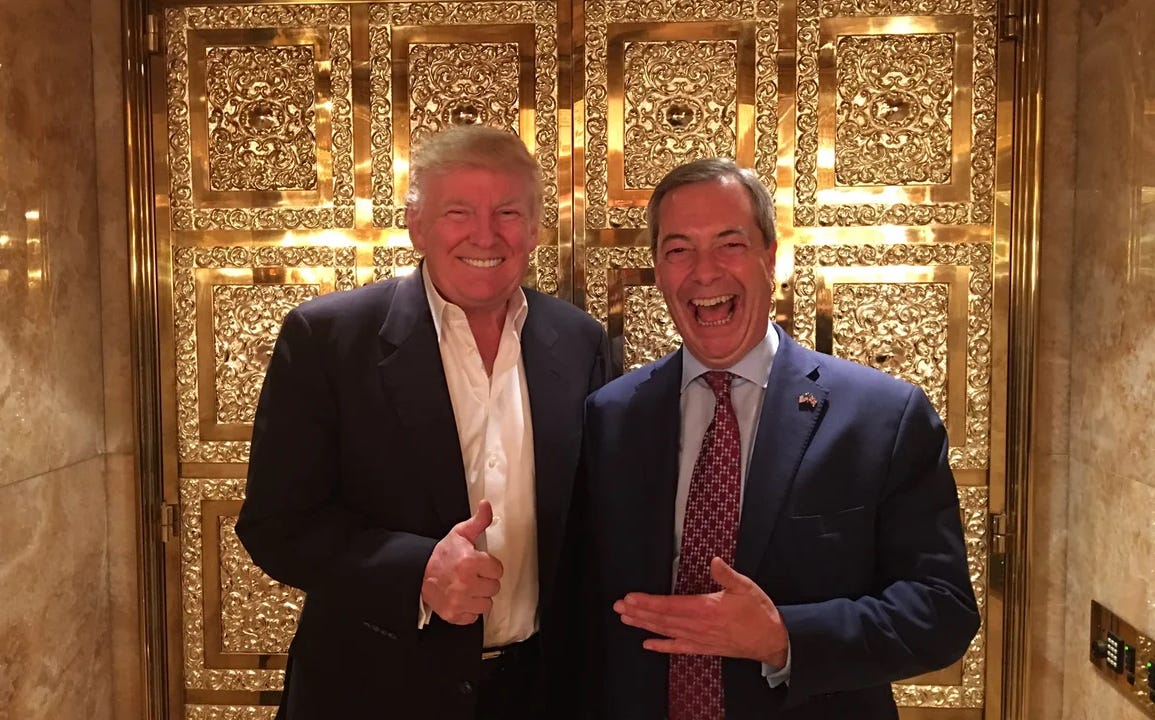Trump’s Apprentice
Welcome to the commodified era of politics...
When Donald Trump took the oath of office, he made a promise to his bank account – to use the powers of the presidency to enrich the Trump dynasty.
Even in the space of a few short months, according to The New Yorker, Trump has executed his plan with ruthless efficiency, making an eye-watering $3.4 billion. Public service has been supplanted by private revenue. Trump has given a masterclass in how to wrap personal enrichment in the flag and call it patriotism.
Across the Atlantic, Nigel Farage has been taking notes. Since entering Parliament in July 2024, the GB News host and part-time MP has pulled in over £1 million a year from non-parliamentary ventures. He’s even been paid £189,300 for a gold-bullion ambassadorship that requires four hours of work a month.
Farage’s desire to merge politics with personal gain seems to have grown since his theatrical ride in the gold lift of Trump Tower the morning after the 2016 US election.
Looking back now, that moment was an initiation into Trump’s new political religion, in which power is relentlessly commodified.
Since then, Farage’s focus has drifted from the staid spectacle of British and European politics to the more profitable shock-and-awe drama of America’s grievance machine. Immersion in Trump’s orbit hasn’t just altered his politics; it’s supercharged his pursuit of profit.
In Britain, this model thrives in fertile soil. Our permissive system allows politicians – even if their careers have been short-lived and ridden with scandal (see Boris Johnson or Liz Truss) – to monetise their fleeting contact with high office.
The rewards are clear and long-standing: after-dinner speeches, media gigs, corporate “advisory” roles. The revolving door in Westminster – and Washington – spins endlessly, thrusting wealth towards the greedy and blurring the line between public duty and private enterprise.
Trump and Farage are squeezing every penny from this system, by applying the corporate marketing playbook to their political pursuits.
In 2025, politics is no longer a game of persuading the undecided. Rather, it’s about building a loyal base and turning them into paid-up members. Social media has industrialised this process. High-profile politicians are now more akin to influencers than policymakers. They sell a brand – one that is simple, highly emotive, and repeatable – to not just win votes, but to capture customers. Apple sells you a lifestyle; political entrepreneurs sell you an ideology and an identity.
And this commodification of politics has coincided with the deep entanglement of Big Tech in political life.
Social media platforms are the hosts of both democracy and capitalism. The same algorithms that decide which trainers you buy also decide which conspiracy theories, grievances, or politicians are beamed into your feed. The profit motives of these platforms and the marketing ploys of politicians have fused so tightly that it’s hard to say where Silicon Valley ends and Westminster, or Washington, begins. Politics now lives inside the architecture of Big Tech, and Big Tech thrives off political division.
That is why perpetual crisis is essential. A content, satisfied public doesn’t donate, click, or buy. The leader must always be under siege, even from enemies that barely exist. It’s a theatrical insurgency – acting like the outsider while hosting champagne breakfasts with billionaires; railing against the establishment while banking its cheques.
No one has pushed this further than Trump. “MAGA” isn’t simply a political slogan anymore – it’s a high-margin brand.
From hats and flags (The New Yorker points out that Trump is flogging MAGA flip-flops for $40) to crypto coins, Trump has made political loyalty and consumer spending indistinguishable. The movement is sustained by constant conflict, ensuring that MAGA supporters are always angry, mobilised and monetised.
Unnervingly, the most important thing in modern politics is brand affinity, rather than votes. It’s a sales strategy that has been transposed onto democracy.
But Trump’s enrichment has not been limited to domestic grifts. In true autocrat style, he used the prestige of the Oval Office to solicit personal favours from foreign governments for himself and his family. His hotels, golf resorts, and businesses have become magnets for diplomats, oligarchs, and tycoons seeking access to the president.
In Trump’s transactional world, diplomacy is just another revenue stream, and the national interest is indistinguishable from the Trump Organisation’s balance sheet.
Farage has already demonstrated how lucratively this formula works from the backbenches. The prospect of him entering Downing Street raises an obvious and urgent question: if he can pull in millions while holding only a seat in Parliament, how might he exploit the full machinery of government?
In Trump’s case, the answer is billions. Farage’s track record suggests he would treat high office as a business opportunity – one funded by the taxpayer, amplified by the media, and underwritten by an increasingly radicalised base.
Farage has even said that Reform intends to accept donations via Bitcoin. Will a Faragecoin be next? I wouldn’t rule it out.
Please consider subscribing to this Substack, where I dig deeper into the intersection of money, politics, and power…
About me
I’m an investigative journalist and current affairs writer who has worked with the New York Times, the Guardian, the Mirror, the New European, Novara Media, New Statesman, Led By Donkeys, and others.
I specialise in exposing dark money and radical right-wing ecosystems.
I also write a lot about inequality and elitism, and am the author of two books on those very subjects: Fortress London, and Bullingdon Club Britain.
Why subscribe
Trump, Musk and Farage are on the march – followed closely by Badenoch and an increasingly radicalised Conservative Party. Investigative journalism exposing their funding sources, their plans, and their networks has never been more important.




Excellent analysis and insight but I just wish it wasn’t true. It’s an uphill battle to prevent us following the same path as the US.
As ever, a brilliant analysis - thanks, Sam. While it’s grim that it’s happening, it’s good that it’s being exposed - the far more worrying thing would be if we weren’t hearing anything about this, which also leads me to think, what else aren’t we hearing about.
Keep up the good work.
🐻